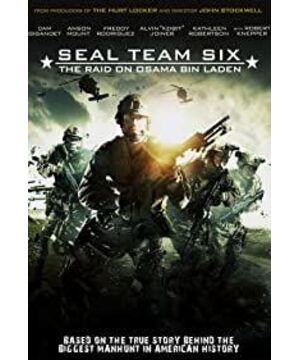By Xiaogu's
two films "Hunting Bin Laden" and "Seal Team Six: Assault on Osama Bin Laden".
In journalism, it is a competition on the same topic. It is impossible to get the most authentic process, and there are not many things to decrypt. Of course, all of this can only be reversed based on the news after the fact. How to round out this result, then what we see is actually this: how American movies, or Hollywood, reasoned about "capture bin Laden".
This project took a long time. My first feeling was actually not the picture, but the structure. When I regarded "Hunting Bin Laden" as a commercial project-according to Hollywood thinking, how did they do it? of?
1. A company needs some "long-term" people.
In the two films, it is not difficult to see that a common dispute continues to appear: it is to spend resources to spend a lot of money, but the effect seems to be poor. The goal is to track Osama bin Laden after 9/11. Above, or leaning on those big carrots that have clues, keep emerging, have a strong sense of reality, and pose a visible threat to the United States? This kind of trade-off is really the most common type of disagreement in a company. This kind of thing can also happen in the media. Is it to do real-time news or in-depth reporting, the headline party is in power, or the good article has the status? Although it is not a life or death, there are too many competitions for resources. This requires a structural arrangement, generally speaking both. However, when it comes to some very important long-term projects, resources need to be inclined to a certain degree, and more costs must be paid, even if it seems that there is nowhere to pay back in the short term. In fact, the truth is not complicated. The Communist Party has understood over the years that it has invested so much money for the chief clothing officer of the Translation Bureau and the others.
2. Appropriate localization is something that the "elites" cannot ignore when making large-scale projects.
Both films have this meaning, but "Poster Six Team" is a bit more obvious. The two frontier intelligence collectors are all Pakistani natives. They all made important contributions at the beginning and end of the process. Usually it is large-scale projects, and there are still many "imperial ministers" level headquarters elites, but if there are no local members to join the team, they will often pay more. This is the case for anti-terrorism, shouldn't companies be like this?
3. The idealistic complex of grassroots employees is worth cherishing.
The protagonists of these two films are both a woman, bent on catching bin Laden's intelligence officers. Their status is not high, but their ideals are very clear, which is to accomplish a big goal. This point is very consistent with the American drama "Homeland Security", a "Dick Girl Spy" Carly, who is determined to catch the important terrorist "Abu Nazir". In the end, it is hard to say how much their "idealistic spirit" really matters. But why do these three stories coincide with each other? Often, the idealistic complex of frontline employees will be seen as a trouble for the company, not as a hope, but even in such a huge project as the hunt for bin Laden, Hollywood without exception regards this as a decisive factor. Does this have a causal relationship with the United States being able to "punish even if it is far away"?
4. Project leaders must learn to accept the challenges of their subordinates, and at the same time, they must continue to lobby the top for resources.
What is impressive is that the heroine in "The Hunt for Bin Laden" told the stationmaster of the CIA Pakistan station that you are going to be the first intelligence stationmaster of the Security Council for not tracking Osama bin Laden. , Or give me more staff to increase monitoring? In the end, her threats worked. This is an extreme case. But this kind of problem is not alone. As a supervisor or leader, especially in the professional field, you must learn to accept the challenges of your subordinates. The challenges accepted by Chinese leaders are mainly in the state-owned enterprises and institutions that have been transformed. For those factory leaders, the workers’ challenges are generally violent or rogue-style, but for professionals, professional challenges may make people lose even more. Self-esteem. When we grow up in an authoritarian society, the relationship between superiors and subordinates that we are used to will inevitably not adapt to some new environments. Mutual respect in personality is the foundation, because when professional conflicts or even attacks arise, what should leaders do? This question is more suitable for Chinese people to think about.
The top level will consider political considerations, not just technical considerations. This has appeared in all intelligence films. So lobbying high-level staff is necessary to obtain policy or resource support, and it is also a required course for project leaders. There are certain skills in this, such as giving three sets of plans to the president.
5. The risk of failure should be considered when project decisions are made, but the risk of giving up should also be considered.
This was what the head of the CIA project in "The Hunt for Bin Laden" convinced him when he reported to White House officials. This statement is very suitable for companies in competition. It may fail. But what about withdrawing? There may be no bones left. So, is it to advance or not to move, or to retreat?
6. The executive team must be reliable and not lose the chain.
During the raid on bin Laden, in fact, a helicopter crashed. However, the SEAL team did not lose the chain, completed the final part of the project, and withdrew smoothly. During this period, "Sea Leopards Six" said it more clearly, and the usual targeted training was very effective. This is actually the basic principle of all projects. Sufficient preparations, plans, pre-plans, resource summaries, etc. in advance.
7. The value issue of project products will be asked more and more.
In the past, we followed two project bibles: 1. Take people's money and help them eliminate disasters. 2. To achieve the goal, use whatever means. This often becomes a kind of "professional ethics" to eliminate many moral dilemmas, which are common in the killer industry, the five-mao industry, and the "mainstream population industry." However, from the perspective of these two films, the evolution of human society is inevitable, and the trend of forbidden torture and the trend of not harming women and children and not killing innocent people indiscriminately is the general trend. Therefore, I will repeatedly emphasize that the SEALs, which do not use missiles, but use precision strikes, will not kill women and children, even the relatives of Bin Laden. Especially obvious is "Homeland Security." The US military's bombing of Abu Nazir's yard, killing his young son, became one of the most important driving forces of the entire American drama. These videos all point to one point: the project product, before only the function of the product itself was paid attention to, and the effect was paid attention to. But now, how the product is made, the production of the product and its own values, have also become the focus of decision-makers and consumers. This is the trend of this era, only presented in the project of hunting bin Laden.
View more about Seal Team Six: The Raid on Osama Bin Laden reviews











